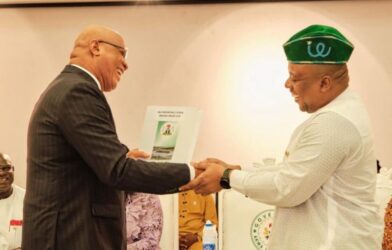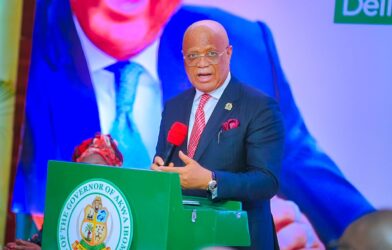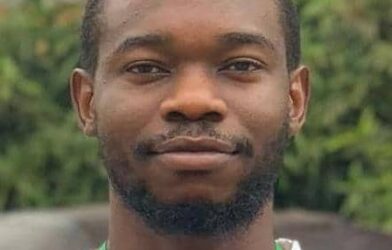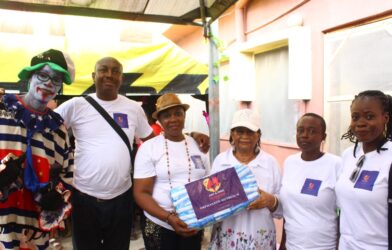222
As a Philosopher with a strong fascination towards African philosophy, I subscribe to the perspective shared by original African thinkers that names symbolise and embodies our stories of nativity and the circumstances of our birth by our parents. Unlike say Britons, who just bear names without attaching deeper meanings to these names such as Mr. Kettle, the African child is given a name that tells his/her story. This is why I as a father, made a decision not to name my children any name that is not originally Igbo. It happened that at the Catholic Church’s baptism of my first and only son, the priest asked for our choice of a name for him, and I gave my son the names Nnadozie Naetochukwu as my selected names. The Igbo priest looked at me with shock and verbally asked for a name of a Saint so we give my son as his name. But I insisted that his name will be Nnadozie Naetochukwu: meaning that God has done amazing favours to us by the birth of my baby because his coming coincided with a highly successful surgery that I underwent in far away Malaysia. The thing is that, as my wife was delivering my son, I was being wheeled into the theatre for a 6 hours surgery. I succeeded.
The above are sharp contrasts to the weak, biased and unintelligent views expressed by the German Philosopher of Idealism, Mr. Georg Wilhelm Friedrich Hegel(27th August 1770-14th November 1833), whose primary thoughts amounted to a negation of Africa from History and civilisation.
For him, and in his tiny Hegelian brain, Africa is not amongst Hegel’s four cultures or civilisations. Africa is said to be unhistorical; undeveloped spirit- still involved in the conditions of mere nature; devoid of morality, religions and political institutions.
Conversely, in his fourfold segmentation of history into Oriental,Greek, Roman and Germanic Civilisations, Hegel explores all the various possible couplings of our ‘trio’: Greek-Roman, Greek-Germanic, and Roman-Germanic(http://
However, philosophers of African descent have rightly embarked on wide-ranging phisophical research to debunk the above and many other wrong headed impressions that Africa is without a history or civilisation. Africa originally, was endowed with indigenous religious, cultural and ideological schools of thought. Africans recognise God and had largely individualised worship of the Supreme Being. The next line will demonstrate my point.
On September 07, 2022 in an article titled: ‘CHILD-NAMING’ TRADITION IN AFRICA, the researchers dwelt extensively on child naming ceremonies which represent African native stories.
The author rightly said that the naming ceremony of a new baby is one of the most important rites of passage in life. In traditional African society, the naming ceremony announces the birth of a new-born, introduces the child to his or her extended family and the larger community, and above all, it confers on the child a name. The name given to a baby can have an enduring influence on their personality and upbringing.
Below are some interesting naming ceremony traditions from a handful of African countries:
Yoruba Naming Ceremony- Nigeria
Among the Yoruba people in South West Nigeria, the naming ceremony of a child is done seven days after birth (on the eighth day). The circumstances surrounding a child’s birth often has an influence on the name that is chosen. Names are typically picked by elders, although members of the community can also pay a token to choose a name for a child. An elder, who is often a grandparent of the child usually oversees the ceremony and it begins with a small prayer and the introduction of the baby. Then prayers and songs of praise welcome the new addition to the family. The presiding elder will then officiate the event with 7 symbolic items that are traditionally used to express the hope or path of a successful life. Prayers are offered using traditional items like salt, honey, kola nut, dried fish, water, beans cooked with corn, and palm oil.
Akan Naming Ceremony- Ghana
The Akan, found mainly in Ghana and The Ivory Coast, are the descendants of the founders of the Kingdom of Bonoman. Traditionally, they leave the naming ceremony until the eighth day as a way to confirm that the child has come to stay and will not be leaving untimely (passing away), returning to the world of the ancestors. They name their children after the respective day they were born. Over time, the Akan people have defined seven names per gender, each referring to a day of the week. The new-born child may also have another name after this, named after relatives (dead or alive), or the circumstances surrounding his or her birth. Naming ceremonies usually take place at dawn because it is believed that the dew at dawn is fresh and it represents the innocence of the new-born. On the day of the ceremony, the baby is named by an elder of the family. Alcohol and water put on the tongue of the baby, signifying the difference between the truth and a lie. It is believed that this will help the child to speak truth in every aspect of his life.
Akamba Naming Ceremony- Kenya
Among the Akamba people of Kenya and parts of what is now Tanzania, the naming ceremony of a child is held on the third day following their birth. Before the naming ceremony, the newborn is regarded as a spirit and not as a complete human being. When a child is born, the parents slaughter a goat or bull on the third day in appreciation of the ancestral spirits for the gift of a child and the fertility of the parents. Many people in the community will come to celebrate and rejoice with the family, and the woman who have borne children get together to give a name to the child. This is known as ‘the name of ngima’, ngima being the main dish prepared for the occasion. On the fourth day, the father hangs an iron necklace on the child’s neck, after which he is now regarded as a full human being, having now lost all contact with the spirit world. Before that, the child is seen as an ‘object’ belonging to the spirits (kiimu). During the night following the naming, the parents perform ritual sexual intercourse, which is a seal of the child’s separation from the spirits and the living-dead, and its integration into the company of human beings. However, if the baby passes away before the naming ceremony, the mother becomes ritually unclean and must be cleansed. The highlight of the ceremony is when the grandmother of the child or an elderly female relative announces the baby’s name.
In deeper appreciation of the aforementioned philosophical thoughts and perspectives on the import of names in Africa and for Africans, I decided to pose a question by way of a quiz on my Facebook page Emmanuel Nnadozie Onwubiko, seeking from the readers and those on my page, to give us their middle native names alongside brief histories of these amazing names. What I got, were overwhelming as they were eye-popping. These are only about a few out of the many but the summary is that our native names embody the history of our birth:
My name is Akunnaya: which means my father’s wealth. My name is Ijeoma, it means go well or A safe journey. This name was given to me by my father based on my mother’s journey into his life which was a safe and smooth one, bringing with it all round blessings in abundance and wishes that I experience such as I journey through life.
Mine is Eberechukwu, meaning God’s mercy: According to my parents they said God used me to show them mercy after pleading for a second male child.
My name is Ndidiamaka. Patience is good. My mum named me Ndidiamaka because she finally gave birth to me after eight years of waiting, praying and believing God. It was indeed a miracle. And my birth actually paved way for other good things that happened.
My name is Uchechi, my parents has 8 girls before my birth. So they thought I will be a boy as they wish. So after my birth they named me Uchechi ga emezu. The next pregnancy after I was a boy and he was named “Chinasamuokwu” who happens to be the only male child among 10 ladies. God is faithful.
My name is Njideka meaning the one I have is greater/better. It’s synonymous to Nkemjika. I was named Njideka by my late father because my immediate Elder sister died immediately after birth.
So when my mum had me 2 years after, and it happened I was also a girl. My dad then named me Njideka.
My name is NWAMALUBIA Read it slowly. It’s a unique igbotic name which means: A CHILD WHO CAME WELL OR A CHILD WHO CAME AT THE NEEDED TIME
My father gave me that name despite the fact that my elder sister is just a year old than I am,that means my mother took in while breastfeeding my sister and even at that my late father named me NWAMALUBIA. I’M THE ONLY ONE WHO BEARS THAT NAME IN MY KINDRED AND POSSIBLY MY ENTIRE VILLAGE.
My name is ENE:In idoma it means Mother.My dad named me after his mum.
My name is Nnennaya:Her father’s mother.
I was named after my grandmother as the first daughter.
My tribal name is Tirnom, which means God’s child. The name was given to me by my mum because when she gave birth to me, she lost her sweet husband and she gave me that name believing it’s only God Who will help her to take care of me.
My name is CHIDIMMA: I was named by a midwife. According to my mother during my birth I was held by several CORD that would have claimed my life , and while the midwife wanted to cut the cords she almost killed me because she gave me a cut on my neck that I almost bled to death.Dimma: best husband
I was given this name because of the love my dad has for my mother. People see my dad as a very caring man to his wife, so when I was given birth they gave me the name and at the same time wished me a good man just like my dad.
Today I have a good man as a husband.
My name is EKenedirichukwu,, All Thanks to GOD or can as well say Praise God.
Another of my social media page contributors added: I love my name so much.My name is Ifechukwu, God’s light, my parents named me that because They said,my birth brought lights to our Family.
My name is Mfonobong, meaning God’s grace or Amarachi in Igbo language.
I will end this conversation with citations from a tiny fictional writing on the erstwhile Chief of Army Staff Lieutenant General Tukur Yusuf Buratai(rtd) titled THE LEGEND OF BURATAI, written by Abubakar M.S.
In this book, the retired top military General said: My name is Tukur. Tukur Yusuf Buratai but most people know me as General Buratai or simply put Buratai. I understand that Tukur is originally an Arabic name and some people said that it was Muhammadu Tukur who ruled Kano from 1893 to 1894 that made the name popular. From what I gathered, the name means extraordinary.
Back in the days when I was a high school student, my English tutor told me that one of the rewards of hard work and diligence is a good reputation and that a good reputation will always promote or elevate one in life. It will surely and certainly make one to mingle and interact with kings and queens or the high and mighty of this world. It has the strong ability to transform a complete nonentily into a star or celebrity might be a better word.
Now this is what fascinated me. My teacher said celebrities are always known by their first name or surname or in some instances a nomenclature that is usually not more than a three-syllable word. I didn’t take this celebrity thing seriously because although I cherish hard work, diligence and excellence in my pursuits, I never wanted to be a celebrity. Iam naturally a shy person, very private, someone who doesn’t like the crowd. Like most young people of today, I didn’t know that hard work, diligence and excellence will always make an ordinary fellow to be extraordinary. I think this is the reason most people call me Buratai even though there are scores of individuals- dead and alive who are also bearing the name as a surname.
I am today the single individual synonymous with Buratai to such extent that once you mention Buratal, the thought of me comes first in the minds of the people. People get fabbergasted whenever I tell them that my name is Tukur. Tukur Yusuf Buratal and that Buratai is the name of my village.
Everything about me starts or emanates from that village. I was born there. I started going to school there too.
That’s exactly the same story about names of African people. Names tell our stories and this is a philosophical fact. Nigeria we hail thee!
Emmanuel Onwubiko is head of the HUMAN RIGHTS WRITERS ASSOCIATION OF NIGERIA and was NATIONAL COMMISSIONER OF THE NATIONAL HUMAN RIGHTS COMMISSION OF NIGERIA.












Comments are closed